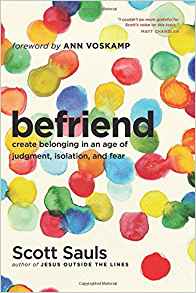Befriend:
Create Belonging in an Age of Judgment, Isolation and Fear
By Scott Sauls
–Review by Teri Hyrkas
Recently there were notices on Facebook encouraging people to participate in the Friends Day event on line. Mark Zuckerberg, Facebook CEO and co-founder, instituted Friends Day to acknowledge the millions of people who have connected on Facebook. It is because of Facebook that the idea of being a “friend” has expanded to include people who meet and establish a digital relationship while using a social networking platform. But here a question arises: Has Facebook widened or has it weakened the meaning of the word friend? Is it possible for digital friends to be considered real friends?
In his book Befriend: Create Belonging in an Age of Judgment, Isolation and Fear,(Tyndale House Publishers, 2016) author and pastor Scott Sauls looks at what it means for Christians to truly befriend people in the digital and physical worlds. What kinds of risks are involved we when we seek out individuals whose circumstances seem to present a barrier rather than an invitation to friendship? How do we get to know others whose situations are vastly different from our own, whose lives and lifestyles are unfamiliar, even antagonistic to ours?
Reaching beyond religious, cultural, and social boundaries defined much of Jesus’ ministry. Sauls says, “Don’t you love how Jesus welcomed the outsiders inside; how he invited them to belong before they believed?” With Jesus’ approach to friendship in mind, Sauls presents twenty essays in Befriend, most of which contain stories about friendships that began as boundary breakers.
Part of Scott Sauls’ definition of friendship includes these words: “Real friendship happens when we move toward the people we are most tempted to avoid. These are the people who are best equipped to challenge our perspectives, push our buttons, and require us to put on love.” In the essay called “Befriend the Bullies and the Perpetrators,” Sauls relates how his statement was put to the test one Sunday. After a church service in which the sermon was about God’s grace, a man named Lou came to Sauls to ask whether Christ would accept him into his family. After assuring the man that Jesus truly loved him, and that there was room for him in the family of God, the man confessed that he was a registered sex offender. Sauls writes: “As he told me this, Patti (Sauls’ wife) and both of our daughters were chatting merrily ten feet behind him. I felt anger. I felt confusion about Jesus and grace. I felt protectiveness toward my bride and daughters. Once again, the implications of God’s grace disturbed me deeply.” Sauls’ writes, “If what the Bible says is true — that salvation is a grace that can reach anyone… then even someone like [Lou] is within the reach of God’s forgiveness.”
Sauls is careful to make a clear distinction between the freedom found in Christ’s gift of salvation and the guidelines for maintaining a healthy friendship. In building a relationship with those who have a history of hurting, bullying and abusing, Sauls says that there is a need for the transgressor to earn the trust of those who extend friendship to them; this takes time, and wisdom, and healthy boundaries.
In another essay called “Befriend the Other,” Sauls opens with this incident: “Once my wife, Patti, and I were in a small prayer gathering with some friends…. As we prayed together, Matthew decided to chime in. This was a drunk prayer that went on for over 10 minutes. He prayed for some of the strangest things. God, protect us from the Klingons. God, I really want a Jolly Rancher right now, will you bring us some Jolly Ranchers? God please move my bananas to the dog house.
“After the ‘Amen,’ everyone looked at me. What will the pastor do? Thankfully, I didn’t need to do anything, because a woman from the group, full of love and wisdom, offered Matthew a cookie. As the woman was giving him a cookie and entertaining a conversation about Klingons and such, five or six others went over to [Matthew’s] wife and begged for insight on how they could help the situation.”
Sauls compares the woman’s compassionate response of offering food to Matthew, who was caught in the midst of intoxication, to the mercy Jesus showed toward the woman caught in adultery. (John 8:1-11) He says, “That kindhearted cookie offer led to… a mob of grace coming around the couple and their two young boys….” It also led to friendships that, over many months, brought about life-giving changes for Matthew, his wife, and family.
Befriend: Create Belonging in an Age of Judgment, Isolation and Fear is a book that is “sticky.” By that I mean that the first person stories that Sauls tells won’t let you go. Befriend was almost impossible to put down, and the stories are powerful enough to sink deeply into one’s memory and heart. I read Befriend alone, which is not the ideal way to read it, according to Sauls. In the beginning of his book the author expresses the hope that Befriend would be read in a diverse community setting, if possible. To help generate discussion in a group, Sauls puts a summary of each essay, scripture passages and a question to consider at the end of each chapter. Whichever way you choose to read Befriend: Create Belonging in an Age of Judgment, Isolation and Fear, it will likely test your thinking about the definition of the word friend and what it means to truly befriend another.

